What is the purpose of the left and right inputs on some subwoofers? An LFE (low-frequency effects) input cable is typically used to link the subwoofer to the receiver, which is more common than you might think. Another way, which makes use of the left and right inputs (RCA connections), is to send low frequencies through the right and left channels of the speaker system, respectively.
Unlocking the Power of LFE in Your Subwoofer Setup
Is it your first time seeing the world of speakers, or are you simply learning something new on your favorite piece of equipment? You might be perplexed as to why there are so many different input and output options available when connecting your subwoofer to its receiver.
Using the more popular LFE cable option, you will most likely not need to use the L and R inputs, which is a good thing. On the other hand, these inputs can be found on the subwoofer regardless of whether the device is equipped with an LFE cable option. If your subwoofer does not have an LFE option, you can use both the Left and Right inputs to create a balanced signal.
What is LFE on a Subwoofer?
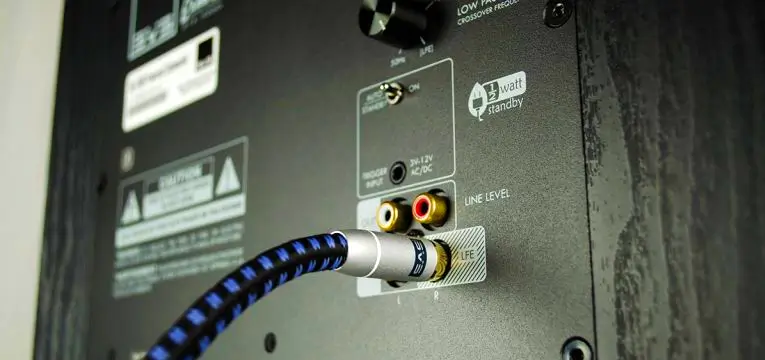
If you are new to the audio world, for example, bringing in new equipment to set up a new home theater, you may be perplexed by all of the many acronyms used.
Everything appeared so straightforward before you started attempting to connect the cords to their proper locations. You might know that LFE is an abbreviation for low-frequency effects, but what exactly does that mean?
The LFE cables are used to connect your subwoofer (low-frequency speaker) to the receiver it uses. Because the subwoofer is responsible for low bass tones (in other words, it serves a single purpose), it necessitates using a transmitter that transmits low-frequency audio waves. The left and right channels are merged in an LFE cable, allowing for a single wire to distribute the signals evenly and efficiently to the subwoofer.
More than likely, you will use an LFE input cable to connect your subwoofers to your amplifier. Left and right input are significantly less likely to be used these days; however, they are still possible.
Most individuals have discovered that employing an LFE input in a subwoofer would effectively transmit the necessary sound from the subwoofer to the receiver, resulting in effective audio production.
The subwoofer produces only low-frequency tones, and this is its main function (think of the deep bass in voice-overs during a movie or the low bass that you can hear in a car driving by).
As a result, the subwoofer must be capable of receiving audio signals that are meant for this speaker’s output: the lowest frequencies of audio production. This is made possible by the LFE input of a subwoofer, which allows for a single standardized connection to be used.
Instead of having to sort through a jumble of cords and cables, you can utilize an LFE input to connect your subwoofer to its receiver with a single cable. To avoid confusion regarding which cable goes where this can be beneficial. However, because this is the more usual (and preferred) form of connection, this probably is what you are accustomed to using as well.
What is RCA Input in a Subwoofer?
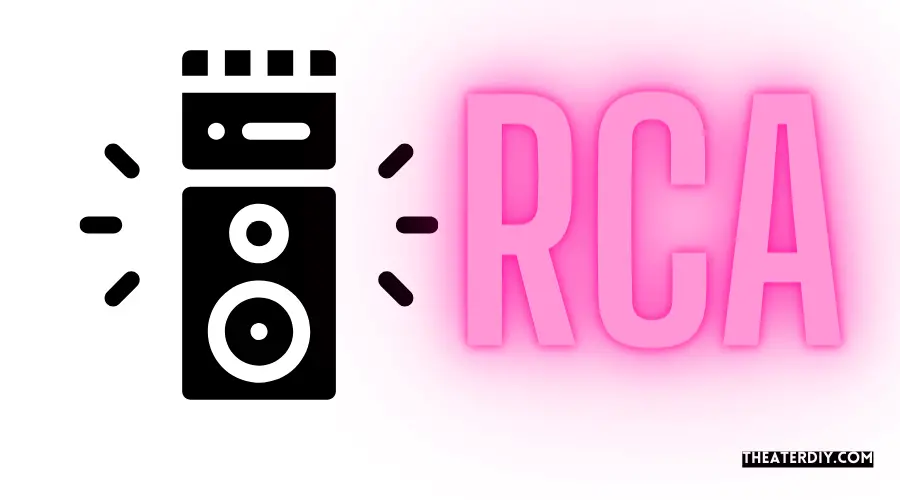
If, on the other hand, your subwoofer does not have an LFE input connection, you will find that your only alternative is to connect your subwoofer to the RCA (Radio Corporation of America) inputs on the right and left channels.
Even though it is less common and often less favored (since it requires two cables instead of one), it is effective and can achieve the desired result.
To achieve digital transmission of low-frequency signals for the right and left channels in a subwoofer, RCA cables are used with a right and left input cable (or split between the two with a Y-cable). An RCA input cable does not combine these audio signals as an LFE input cable; instead, the RCA input cable places them in specified locations: the right and left input options that connect the subwoofer to its receiver.
The RCA inputs for your subwoofer will be visible in the left and right input options for the subwoofer. Your subwoofer may offer the option of connecting via an LFE cable in addition to the left and right inputs.
Most users will choose to use an LFE cable in this instance, albeit it is not strictly necessary. In contrast to an LFE input, which only has a single wire, the left and right inputs work as a dual set.
Even though it is not significantly more complicated (requiring either one additional connection or the use of a y-cable to connect the right and left), it requires significantly more effort than utilizing an LFE input cable. Additionally, you may discover that the overall audio effects produced by the usage of RCA input are less than satisfactory. However, this is not always the case.
What Cable Do I Need to Connect Subwoofer to Receiver?
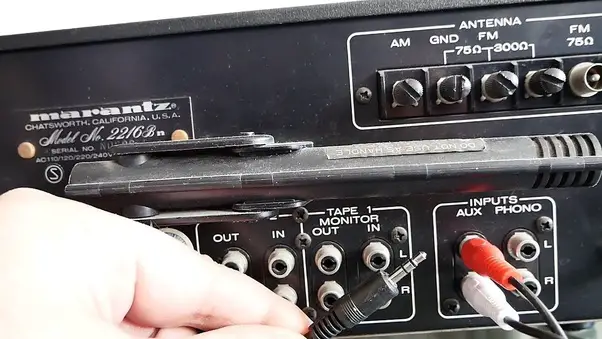
Following our discussion of a few acronyms and their various functions, you should have a clearer knowledge of the differences between LFE and RCA input cables in terms of their intended use. However, after reading this, you might still be perplexed as to which wire you’ll need to connect a subwoofer to its receiver.
Use an LFE input cable or an RCA line-in cable to connect a subwoofer to its receiver, depending on your preference (used for left and right input options). If your subwoofer has the option of using an LFE input, this will be your best alternative, assuming that it does. However, if this is not the case, an RCA input will suffice. Make sure you read the instructions that came with your subwoofer for further information on using it.
Identifying your subwoofer’s input and output options should be your first step if you are unsure of the cable you require or if your subwoofer even came with cables.
If you find that your subwoofer and receiver both have an LFE input/output option, this will be the quickest and most straightforward solution for you. If this is not the case, an RCA input cable will link the left and right inputs together.
Consider if it would be worthwhile to invest in a secondary subwoofer if your subwoofer does not have an LFE input option. If your subwoofer does not have an LFE input option, consider whether it would be worthwhile to invest in a secondary subwoofer to employ a dual connection. The use of an equalizer, in this case, will assist your subwoofers in balancing the communicated signals and achieving the desired impact of creating the transmitted audio effectively and efficiently.
Getting started in the realm of dual subwoofers might be intimidating, especially if you are unfamiliar with the technology. However, this is one of the reasons why you should engage or seek guidance from a qualified specialist.
While most audio professionals will recommend employing multiple subwoofers to enhance the distributive localization of the music and provide a more immersive surround sound experience, this may not always be feasible for your particular situation.
Are Dual Subwoofers Worth It?
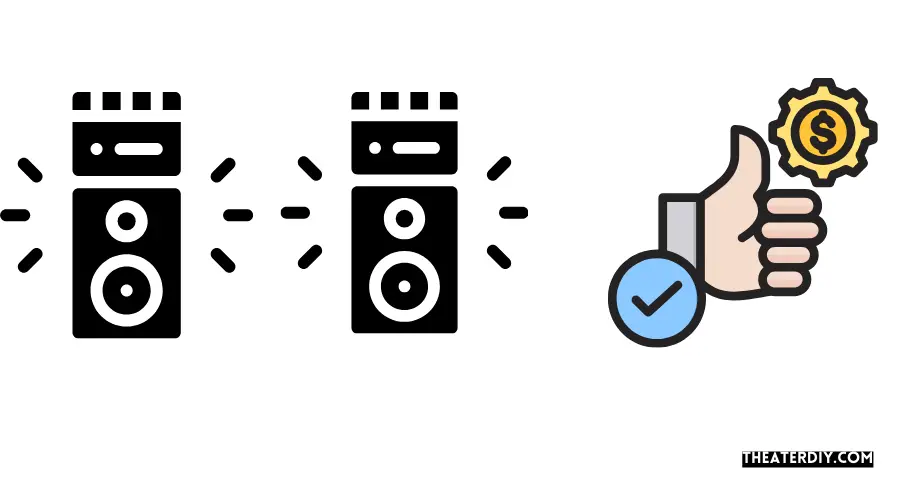
A common recommendation from audio experts is to use two subwoofers, but do you need this configuration for your basic audio demands in your home? You might be wondering if this is a necessary investment or if it is an unnecessary overkill that will increase the cost of your home sound system.
Dual subwoofers will provide a substantially more polished sound experience for low-frequency tones compared to a single subwoofer. Because using two subwoofers eliminates the capacity to localize the sound, you will perceive the bass as more of a “surround sound” effect than you would otherwise hear. With dual subwoofers, the equalization of signals can be completely avoided.
So, yes, dual subwoofers are a good investment if you have the money to spend on the additional equipment and the time to learn how to correctly set up the two subwoofers (or hire someone to do it for you). However, numerous online tutorials will walk you through setting up dual subwoofers, so not understanding how to do so should not prevent you from making the purchase.
A single subwoofer is used to produce the deep bass tones that can be heard emanating from this speaker when it is used. As you work to discover an ideal location for your subwoofer in your home, you should be able to reduce the need for your auditory processing skills to localize the sound in your environment.
This will be accomplished when the subwoofer is positioned in the center of the room, and you can perceive the bass as coming from a “head-on” direction.
When you employ dual subwoofers, on the other hand, you can more easily transition away from localizing the sound and can use the duality of the speakers to improve the surround sound effect further.
It is no longer necessary to locate the center of your living room to place your subwoofer physically; instead, you can use two and angle them so that they work well together in producing the surround sound effect. Gone are the days of carefully squatting in different positions in your living room to determine whether or not the bass can be heard clearly from all directions. Using a dual subwoofer arrangement will completely alleviate this problem for you.
Furthermore, dual subwoofers do not necessitate the equalization of transmitted signals, which is beneficial. Instead of being equalized inside a single speaker system, the dual subwoofer allows the transmitted signals to be equalized more effectively in two low-frequency speakers, which increases the system’s efficiency.
You may need to witness it to believe in the efficiency of employing two subwoofers rather than one to believe it.
While keeping these points in mind, try to put your theory to the test by visiting a friend or an audio store that can demonstrate the difference between using twin and single subwoofers. Adding a subwoofer to your home audio system will almost certainly prove to be a worthwhile investment.
Best Seller List of Subwoofers:

- 10" front-firing spun-copper IMG woofer
- All-digital amplifier with 300 watts peak power
- Volume low pass crossover and phase control
- Line level LFE RCA inputs for maximum receiver compatibility
- Dimensions 14 5" x 12 5" x 16 4"
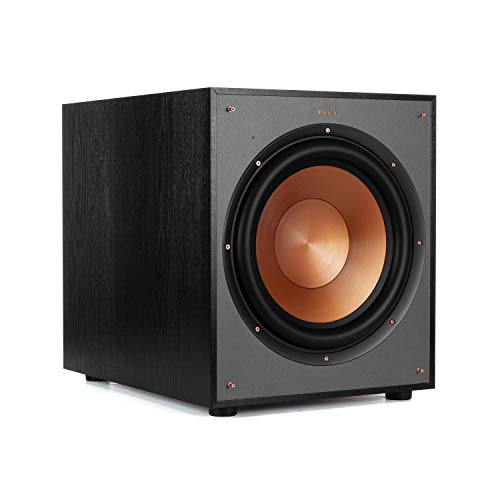
- 12" high excursion spun-copper Imp woofer
- 29 hertz – 120 hertz plus /- 3 dB
- 400 watt
- Max acoustic output 116dB
- Bass-reflex via rear firing port. Amplifier power (control/peak): 200 watts/400 watts

- Equally impressive with music and movies;Brushed black polymer veneer cabinet with satin painted plinth
- Low pass crossover and phase control
- Line/LFE inputs for compatibility with most receivers
- Equally impressive with music and movies

- Active 10” subwoofer perfect to provide that extra punch for your home theater or music listening setup
- Amplify your movie, music, and gaming experience with a speaker that provides full frequency audio with a three-way coaxial, four-driver speaker system
- Create a robust 5.1.2 home theater setup perfect for Dolby Atmos with the complete range of CS speakers from Sony with the SACS9 subwoofer, 2 SSCS3 tower speakers, 1 SSCS8 center channel speaker, 2 SSCS5 bookshelf speakers, and 2 SSCSE Dolby Atmos enabled speakers
- 10” Dual layer mica woofer diaphragm delivers faithful sound and optimal bass response
- Motion feedback technology utilizes detection circuitry to correct variations in the input signal, helping to prevent distortion


- New twisted flare port contributes to clear and tight bass
- Advanced YST II (Yamaha Active Servo Technology II)
- 8” cone woofer
- Stylish addition to any room
- Dynamic Power: 100W (5 ohms)


- POWERED SUBWOOFER FOR EXTRA BASS and PUNCH – A 10-inch Dynamic Balance woofer and a uniquely configured directed port provides accurate bass with added depth that brings your music and movies alive. A perfect solution for your small-to-mid size room.Waterproof : No
- LOUDER CLEARER SOUND EVEN AT HIGH VOLUME – Enjoy a thrilling yet balanced music experience with rich, deep sound, even at low frequencies. BLENDS EASILY WITH ANY SPEAKER and plays the most demanding nodes effortlessly without any distortion
- DOUBLE THE AMPLIFIER POWER TO 100 Watts of Dynamic Power with its in-built 50-watt RMS amp. Sophisticated engineering with best in class resonance-free driver materials make this sub highly durable and FIT FOR EXTENDED USE
- EASY TO INTEGRATE WITH EXISTING SYSTEMS – Hook up this sub to the receiver and upgrade your music sound instantly. Features continuously variable 80-160 Hz crossover and 40-160 Hz (-3dB) frequency response
- A sleek detachable grille on the front, speaker and line-level inputs as well as speaker-level outputs on the back, and a Phase Toggle Switch for multiple subwoofers, make this sub cohesive and complete.


- Spun copper front-firing Cerametallic woofers
- 10-inch, front-firing driver
- 150 watts continuous, 300 watts dynamic power
- Strong, flexible, removable grille
- All digital amplifier for high-efficiency and true-to-source sound accuracy


- Enclosure Type: bass reflex
- Amplifier Type: Class AB
- Amplifier power: 120 watts peak/ 60 watts RMS
- Frequency response: 38hz-200hz; crossover frequency: 40hz-200hz
- Driver: 10" Low Throw dynamic woofer with these inputs: L/R/LFE/speaker level


- Compact Design But Powerful Subwoofer - This powered subwoofer is suitable for your room, completing the system by adding the deeper notes of music that have been recorded. For music reproduction, it does a great job.
- Powered Down-Firing Woofer - SW65C is a down-firing subwoofer, designed to fill your room with immersive surround sound and deliver low, tight, and smooth bass.
- Works with speakers, turntables, TVs with an analog output, CD and DVD players, video game consoles, and all products with 1/8" mini-jack or RCA outputs. Please kindly note that the function of the sub is to enhance the bass only. We recommend you pair it with your speakers.
- Be Compatible With Your TV - The subwoofer can work with a TV that supports audio output connection. Set the sound output option to TV and external speaker, and you can connect the subwoofer directly to your TV. If your TV doesn't support this sound output option, we recommend pairing the subwoofer with other speakers/soundbar first, and then connecting it to the TV.
- Wired Connectivity: The subwoofer's primary role is to enrich bass reproduction. To ensure top-tier performance, we suggest linking this subwoofer to a stereo or multichannel audio system using a range of input options, such as RCA input, Aux input, LFE input, and high speaker level input and output connections.


- Seventour ST-800 10 inch Ultra Slim Under Seat Active Powered Car/Truck Subwoofer with Built-In Amplifier, Enclosure made of cast aluminum for excellent heat dissipation and reliable performance.
- This is a new 2024 upgraded car subwoofer audio that features a personalized spider speaker protector as well as a speaker LED ambient light ring design. When the car is started, the subwoofer lights up with blue LED lights. Make your car look more cool and dynamic.
- This ST-800 car subwoofer includes wired bass volume remote control. With gain, bass boost and crossover controls, peak power: 800 watts, giving you a stunning bass experience.
- The Car Sub supports low level RCA inputs. It is also compatible with high level inputs, adjustable input sensitivity, thermal protection circuitry, short circuit protection circuitry, overload protection circuitry, green power/red protection LED.
- Low Pass Filter: 50Hz - 150Hz, Bass Boost: 0 - 12dB @ 45Hz, Built-in Sub-Acoustic Filter Load @ 20Hz, Total Harmonic Distortion (THD):
Last update on 2024-07-25



